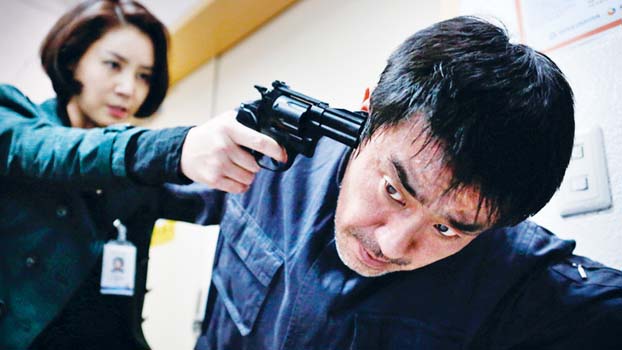A tonally disjointed experiment that misses The Target

The film kicks off with a nocturnal chase in which injured protagonist Baek Yeo-hoon (Ryu) outruns his pursuers, only to get hit by a car. He is rushed to the hospital, identified as a murder suspect, and assigned to the care of Dr Lee Tae-jun (Lee Jin-uk). Next thing Lee knows, a stranger has broken into his home and kidnapped his heavily pregnant wife, Hee-joo (Jo Yeo-jeong), in exchange for getting Baek out of the hospital.
This proves harder than it already sounds, as Lee not only has to dodge the cop sent to guard him by Inspector Jung Young-joo (Kim Sung-ryoung), but also has to contend with Baek, who will tear his way out in order to escape alone. A hospital bed stuck inside an elevator serves as an unlikely prop for a caged-beast combat scene in which Baek, comatose only minutes before, bounces back like a zombie and kicks merciless ass with a fire extinguisher before battering Jung to the ground, with no chivalrous regard for her gender.
Lee and Baek form an uneasy alliance when they realize that Hee-joo has been held captive by Baek’s brother Sung-hoon (Jin Goo), who’s been the cause of all this trouble. Hunted by three parties — mobster Jung Pil-ju’s henchmen; Jung and her junior Soo-jin (Cho Eun-ji); and Senior Inspector Song Kee-chul (Yu Jun-sang), who’s always overriding Jung’s operations — the two men decide to take the offensive.
The narrative arc follows “Point Blank” quite closely, despite some differences in the characters’ backgrounds, as well as several location shifts from more intimate settings (like private apartments) to more crowded public places, raising the stakes in terms of danger and chaos. What makes this a typical Korean genre film is the way it pushes the original’s hardboiled elements to a new level of psychotic fury and punishing violence.
At some points, it’s as if the characters have been looped into a head-smashing, neck-wringing, bone-crunching continuum that provides no room for a breather between the spectacularly staged main setpieces. A scene of Hee-joo being tortured in a toilet, which segues into a boxing match between two distaff cops, plays like something out of a kitschy sexploitation movie, the superb martial-arts choreography notwithstanding.
There’s also much fetishization of pain, underscored by classic John Woo moments of Baek dressing his own wounds or Lee stitching him up sans anesthetics. And even as his gushes gallons of blood, of course the fugitive can still take down whole battalions of armed gangsters — all of which will serve to spike the adrenaline of fanboys who so thrive on raw action that they won’t bother following the scattershot plot or care who gets rubbed out along the way.
“The thing about emotion is that it only lasts one moment,” says Song with cryptic coolness, and emotion is certainly the last thing the cast needs to worry about here. Baek’s character has been “cleaned up” from the petty data thief of the original, but neither his innocence nor his love for Sung-hoon, nor even the fact that he owns a darling dog, can flesh out his personality. Ryu, a beloved thesp from big hits like “Miracle in Cell No. 7,” projects a ruggedly cool image in leather jackets and designer stubble, making up for his lack of emotional heft with dynamic physicality.
The mentally challenged, stammering and muscle-twitching Sung-hoon, a character with no antecedent in the French version, reps the worst attempt at milking audience sympathy here.
—Variety




